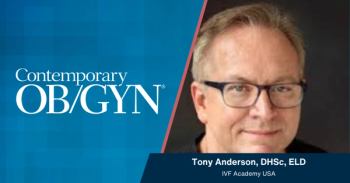
www.ReproMED.org.uk: Application of the Internet to Support Education in Reproductive Medicine
OBGYN.net Conference CoverageAdvances in Infertility, January 2002
Hans van der Slikke, MD, PhD: “It’s January of 2002, and we’re in Fort Lauderdale, Florida at the Advances in Infertility Treatment Conference. Next to me is Julian Jenkins from Bristol - welcome, Julian. You’re presenting a poster here about ReproMED which is a website with a teaching capacity. How did your story start on building this website?”
Julian M. Jenkins, D.M., FRCOG: “The story started back in 1995 when we were establishing a CD ROM resource to help educate general practitioners. In the early days of the resource we were finding that progressively the resource resembled what was really a web browser. Coincident with the actual development of the CD ROM resource was an increase in the actual use of the Internet, and our department started to set up websites for a number of national societies. It became apparent as time went by that rather than actually create a CD ROM resource to supply the information about reproductive medicine it may be more appropriate to create a website than use a web browser as the actual method of assessing the information and accessing information from the website itself. So that’s in essence how the whole ReproMED website began - the evolution from the CD ROM resource to a website resource which came concurrently with the introduction of more use of the Internet.”
Hans van der Slikke, MD, PhD: “So that’s the technical background and that’s how it developed until now but what was the aim of setting up first your CD ROM and now your website?”
Julian M. Jenkins, D.M., FRCOG: “The main aim when we first set up the actual CD ROM resource was to evaluate the feasibility and usefulness when applying information technology to support education and clinical practice in post-graduate education. With the website, the focus there was to look at the role for the Internet to support post-graduate education principally and we were very fortunate at that time in that we had considerable support from the National Health Service grants to provide us with educational experts and junior doctors to do the actual content work and also to have reasonable facilities to create an actual website. So what we were able to do was to create the website as an assessment tool to look at the actual role of the technology itself in the actual introduction of this form of technology for supporting post-graduate education.”
Hans van der Slikke, MD, PhD: “Yes, and which field of post-graduate education of medicine do you cover?”
Julian M. Jenkins, D.M., FRCOG: “With the introduction of this very much focused project what we concentrated on was the teaching of obstetrics and gynecology to junior doctors occupying the south-west region of England. Around the time that we were actually developing this website there was a very major change in the way that education was being conducted for the junior doctors with the introduction of what was called Calmanisation* and the special registrar grade. What we wanted to look at and see to what extent the Internet could help support in this new sort of opportunity for a more structured education in obstetrics and gynecology and that really was the principle focus of the early parts of the actual project - looking at obstetrics and gynecology with the junior doctors.”
Hans van der Slikke, MD, PhD: “Did this also open the way from your region around Bristol to, let’s say, the rest of the world?”
Julian M. Jenkins, D.M., FRCOG: “It did indeed, you’re absolutely right. One of the early programs we looked at was to teach people about the various key aspects of reproductive medicine using a web browser as the actual delivery tool. We advertised this on the website for the region in which we set up but to our surprise we found that the number of actual delegates from outside the UK were interested in partaking in the actual course and we saw no reason not to accept them. So even for the very first program we had people that came from Norway, for instance, who very much took an active part in the actual course which is very rewarding.”
Hans van der Slikke, MD, PhD: “Do people have to pay to have this registration for their website?”
Julian M. Jenkins, D.M., FRCOG: “Again, we’re very fortunate with the actual website in that the initial setup of the website was funded by the National Health Service grant, and it was essentially a research project to look at the role for information technology to support education. We were more fortunate in the number of pharmaceutical companies providing funding, including Ferring, to help support the various projects that we were actually providing. We even had support from various charities and then provided money to develop resources within the actual website. As things developed, we did in fact set up some courses which there was a fee to enroll in the course but a very modest fee in that a large proportion of the course was still actually covered by various sponsorship.”
Hans van der Slikke, MD, PhD: “I see, and following this course do you have something like CME accreditation?”
Julian M. Jenkins, D.M., FRCOG: “This is certainly a very important aspect of providing the courses and we looked at what motivated people to partake in the course and to complete the courses. One of the things that we did identify as a very positive incentive to complete the course was to have a formal certificate at the end of the actual course rather than simply do exercises on a website with no particular apparent gain so the course is actually certified.”
Hans van der Slikke, MD, PhD: “So in this way you have collaboration with your Royal College?”
Julian M. Jenkins, D.M., FRCOG: “Certainly, we’re close to the Royal College and, in fact, I’m one of the members of the body that helps to advise the college on the developments of the website. We are very keen to maintain the links between this website which is used as a regional website for the trainees with the actual national website which is used for all members of the college throughout the whole world and, of course, also is a resource to provide information to the public about the areas of obstetrics and gynecology.”
Hans van der Slikke, MD, PhD: “Yes, and you stated earlier that it was set up as a kind of research if the Internet could be effective in education. What’s your conclusion now?”
Julian M. Jenkins, D.M., FRCOG: “Very much it was set up as a research project to look at the practicality of could it be done and was it worthwhile doing. I think probably the most significant conclusion from the research we’ve done to date was the introduction of the formal masters degree course which covers the whole aspect of reproduction and development which is accredited by the University of Bristol as a full degree course, the same as any other, and that now is delivered through a combination of workshops where people would come to Bristol for a period of no more than nine weeks over a two year time period if they were taking the part-time option and the bulk of the actual training and education is conducted over the Internet. I’m very pleased at the actual research we’ve done with the actual use of the Internet post-graduate education which has led to the introduction of this course which to a large extent ratifies that the actual use is very much with us and it certainly is a very positive method to post-graduate education. It particularly has advantages when we look at the practicalities of post-graduate education where people may be engaged in full-time employment and by using distance learning techniques where people can do things at their own time, they’re then able to have a much more flexible approach to their education where they can stay in full-time employment wherever they’re based in the world and still study for a higher degree which can help them with their career advancement. So I think our conclusion really has to be that the Internet is very much a positive tool to support post-graduate education. I think very importantly though it needs to integrate with workshops; we shouldn’t rely purely on the Internet on its own to do post-graduate education.”
Hans van der Slikke, MD, PhD: “Yes, and then it also perhaps enables you to educate more people together at one time and your capacity grows because of doing it this way.”
Julian M. Jenkins, D.M., FRCOG: “You’re absolutely right, because we’re using the Internet it does open the opportunity for people to engage in education and in particular, I think, this is with international dimension where for many years we had many people who wished to come from various parts of the world to Bristol to get an education in our center but this was not practical because we didn’t have the accommodation or the physical space to accommodate them but now by using the Internet to broaden the horizon, we’re now able to offer many more people the opportunity for a University of Bristol degree.”
Hans van der Slikke, MD, PhD: “This is very interesting, thank you very much.”
Julian M. Jenkins, D.M., FRCOG: “Thank you.”
* introduction of sweeping changes in junior doctor training introduced by Kenneth Calman
Newsletter
Get the latest clinical updates, case studies, and expert commentary in obstetric and gynecologic care. Sign up now to stay informed.









